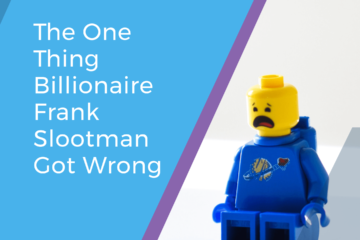
My brother-in-law has taken on a memorable role in family birthdays. No matter who is celebrating—from toddler to grandparent—and no matter what time of day—from morning breakfast to late at night in a bar—he always remembers to ask his patented question: “What did you learn this year?”
Most years, we attempt to avert the awkwardly-philosophical question with some witty banter. But this year, I’m pretty sure all of us could write a novel on the topic. We’ve learned about our world, our countries, our societies, our health, our families, and ourselves.
And in a much more trivial sense, we’ve learned a great deal about our businesses. Most notably, we have learned how to survive and thrive. And in the world of Business-to-Business (B2B) relationships, we have learned how critical our clients are to making it through ups and downs.
Specifically, the Customer Success world learned 10 important lessons in 2020:
1. Customer Success Helps Businesses Survive Through the Pandemic

2020 was a stress test for recurring revenue businesses. Every client had a decision to make on which subscriptions to renew and which ones to churn:
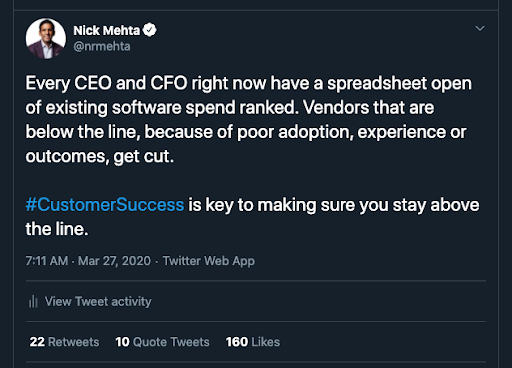
Companies with Customer Success strategies demonstrated value to their clients during these tough times and preserved client relationships. And every CEO got the wake-up call. As a CEO friend of mine remarked in March 2020:
The things we’re doing in CS these days—and Gainsight is absolutely key to making it happen—are so freakin great. We’ve talked about CS moving from reactive to proactive (who hasn’t?) for years. In the last 30 days, it’s just …. happened! So great.
2. Customer Success Helps Businesses Rebound – Through Their Clients

Once companies got through the initial panic from March to May, many technology firms started growing thanks to expansion in their existing clients again. While new sales were still tough to come by at the time, current customers were willing to increase their spend with known vendors.
In fact, we observed Chief Revenue Officers doubling down on Customer Success more than ever in 2020 due to this phenomenon. In this blog post, we shared some lessons from the CROs of Dropbox and Flexera.
3. Net Dollar Retention Becomes THE Metric

Building on the previous point, with expansion coming into its own as a critical element of the cloud business model, investors have realized that the most telling metric about a business is its “Net Dollar Retention” rate (NDR). Most public companies now disclose the metric, and analysts and money managers know to ask about it.
NDR is often a litmus test for the company’s product-market fit, value proposition, and growth efficiency, all in one. In the words of a Chief Revenue Officer (CRO) of a recently IPO-ed company I spoke with a few weeks ago: “We honestly never tracked NDR. And now every investor is asking about it. We need to get our act together, so we get ahead of it.”
And the market is voted with its share purchases. Companies with higher NDR tend to be valued more highly:
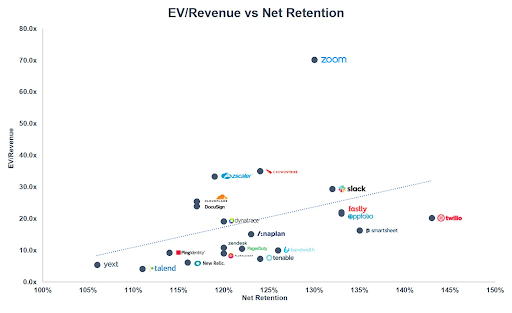
4. Customer Success Is a Unicorn

The Oxford Languages dictionary defines a unicorn as “something highly desirable but difficult to find or obtain.” Customer Success as a concept truly fits that definition. Every recurring revenue business is moving toward the model – and it’s hard to get there.
As such, the industry was proud to see Vista Equity Partners, the most successful private equity investor in software, invest in Gainsight (at a unicorn valuation!) Vista saw Customer Success as a critical part of the transformation for the companies in which it invested and viewed it as the next big technology opportunity.
5. Customer Success Isn’t Just a Function–It’s About End-to-end Value

One of the biggest buzzwords you would hear if you joined a CS networking event is “value” (or “outcomes”). The core idea is that businesses don’t buy products and services just to “adopt” or “use” them—they buy them to achieve business results.
When you expand the framing of Customer Success to encompass outcomes and value, it becomes clear that Customer Success isn’t just a department. Value/outcomes is an end-to-end concept. Value starts in Product development, where a team defines a value proposition. Value is then promised to the market through Marketing. Sales discovers the client’s desired Value— and promises to make it happen! Services might implement a solution aligned to Value (hopefully). Customer Success could then be there to deliver and demonstrate the Value. And ultimately, profit!
Well, that’s not how it usually works. Often we see:
- Product teams build features
- Marketing teams create a brand
- Sales teams promise an ROI
- Services teams finish the “project”
- CSM teams come in at the end and ask, “so what are you trying to achieve?”
2020 was the year when value became the north star. Nearly every enterprise-oriented CS team that we meet is focused on driving value end-to-end, including poster child Splunk, featured in this blog post.
6. Customer Success and Product are the New BFFs

Speaking of Customer Success going beyond CSM, one of the most important cross-functional partnerships for the CS team is their Product buddies. In most businesses, the Product is the most scalable way to deliver a great experience and strong value for clients. As such, in 2020, nearly every company decided to invest in:
- Rich product analytics data so Product and CS understand how clients are using the product
- In-application feedback, to compliment email-based surveys, to help the company understand the customer’s experience
- Personalized in-product engagements to help nudge the user through the client journey —from onboarding to new release to feature adoption and more
7. Customer Success Is Forced to Scale

One of the most common challenges for Customer Success teams in 2020 was the following:
- We are getting new clients
- But we aren’t hiring!
That wasn’t uniformly true, but very few companies grew their CS teams as quickly as they expanded their revenue. As such, every Customer Success team we’ve met prioritized “at-scale” or “tech touch” Customer Success in 2020. They realized they couldn’t just throw people at the problem.
These businesses implemented customer journeys that were a hybrid of multiple engagement models. They might lean on digital methods (email, in-product, text, etc.) first and then get humans involved on an as-needed basis. 2020 was all about scale.
8. Customer Success Operations Teams Are Must Have

In the early days of Sales, many companies had a philosophy that could be described as “hire good people and let them do their thing.” Today, most Sales organizations still try to hire well, but they often complement hiring with enablement, process, automation, and analytics. To help make that vision a reality, the field of Sales (or now Revenue) Operations was created.
In a similar vein, Customer Success teams that are scaling realize the ROI of an operational focus. CS Operations is one of the hottest jobs in the industry. And according to our recent 2021 budgeting survey we conducted, Ops is one of the most significant investment areas for most companies.
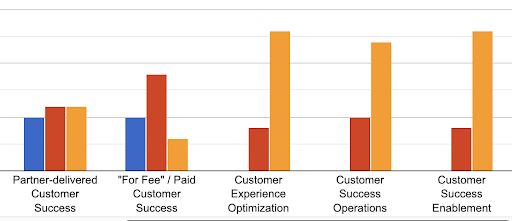
9. Customer Success Needs to Be More Inclusive
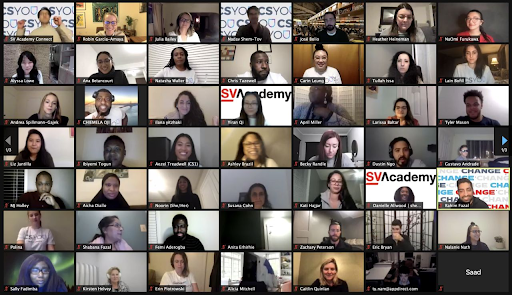
2020 was rightfully a year of awakening for many around the injustice in our society and the tech industry’s lack of diversity. While Customer Success is diverse in some lenses (e.g., gender), we still suffer from the embarrassing lack of underrepresented minorities in CS that the rest of tech experiences.
We were inspired to see the traction around our CS YOU initiative to bring more underrepresented minorities into Customer Success through apprenticeship programs. Learn more here.
10. Many Of Us Are Privileged and Should Be Grateful

2020 was a banner year for the cloud. Customer Success became mainstream in 2020. Gainsight turned into a unicorn.
At the same time, 2020 was a terrible year for humanity. So many lives were lost. So many livelihoods were jeopardized. So many hearts were broken as loved ones suffered.
All of us should be proud of what we’ve accomplished in 2020. But we should all pause and reflect on the fortune we’ve had.
I’ll close with a quote from author Michael Lewis, from his commencement speech at Princeton in 2012:
The “Moneyball” story has practical implications. If you use better data, you can find better values; there are always market inefficiencies to exploit, and so on. But it has a broader and less practical message: don’t be deceived by life’s outcomes. Life’s outcomes, while not entirely random, have a huge amount of luck baked into them. Above all, recognize that if you have had success, you have also had luck — and with luck comes obligation. You owe a debt, and not just to your Gods. You owe a debt to the unlucky.
Here’s to better days in 2021.
Happy holidays to you and your loved ones. Stay safe.



